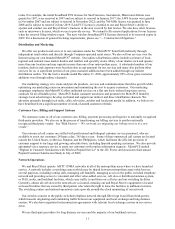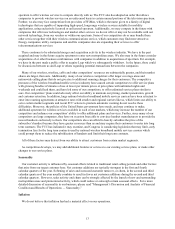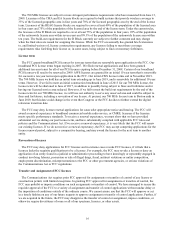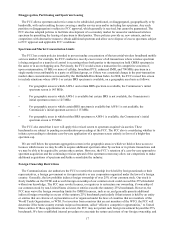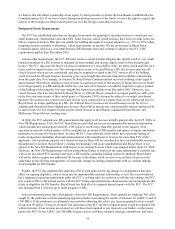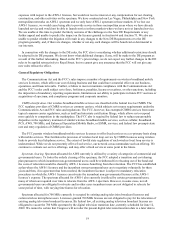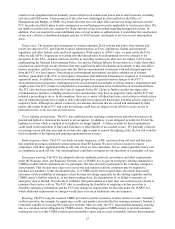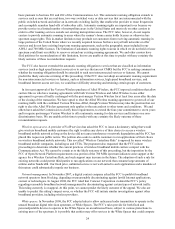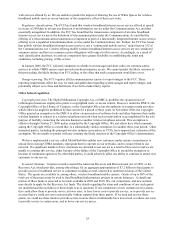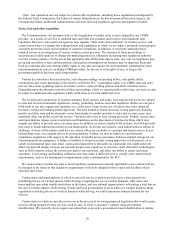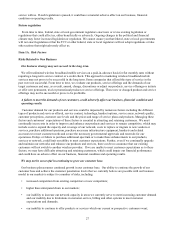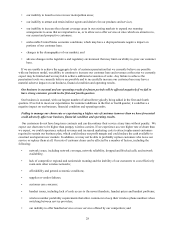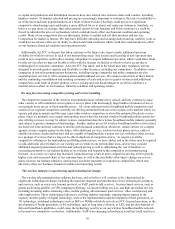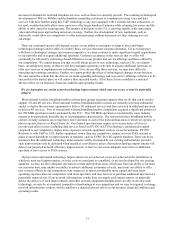Metro PCS 2008 Annual Report Download - page 30
Download and view the complete annual report
Please find page 30 of the 2008 Metro PCS annual report below. You can navigate through the pages in the report by either clicking on the pages listed below, or by using the keyword search tool below to find specific information within the annual report.21
rules or rates set by state public utility commissions applying the FCC’s rules. CMRS carriers also have an
obligation to engage in voluntary negotiation and may be subject to arbitration with incumbent local exchange
carriers similar to those imposed on the incumbent local exchange carriers pursuant to Section 252 of the
Communications Act. Once an incumbent local exchange carrier requests negotiation of an interconnection
arrangement, both carriers are obligated to begin paying the FCC’s default rates for all intra-MTA traffic exchanged
after the request for negotiation.
CMRS carriers generally are obligated to pay reasonable compensation to a local exchange carrier in connection
with intra-MTA traffic originated by the CMRS carrier and terminated by the LEC. While these rules provide that
local exchange carriers may not charge CMRS carriers for facilities used by CMRS carriers to terminate local
exchange carriers’ traffic, local exchange carriers may charge CMRS carriers for facilities used to transport and
terminate CMRS traffic and for facilities used for transit purposes to carry CMRS carrier traffic to a third carrier.
Since 2005, no local exchange carrier has been permitted to impose on a going-forward basis rates by state tariff for
the termination of a CMRS carrier’s intra-MTA traffic. We generally have been successful in negotiating
arrangements with carriers with whom we exchange intra-MTA traffic; however, our business could be adversely
affected if the rates some carriers charge us for terminating our customers’ intra-MTA traffic ultimately prove to be
higher than anticipated. Further, the rules governing interconnection are under review by the FCC in a rulemaking
proceeding, and we cannot be certain whether or not there will be material changes in the applicable rules, and if
there are changes, when they might take effect and whether they will be beneficial or detrimental to us.
Access. In order to offer long distance services to our customers, we resell the long distance services provided by
third parties. Those third parties are obligated to pay compensation to the telecommunications carriers who
terminate our subscribers’ long distance calls. Historically, CMRS carriers generally have not been entitled to
receive direct access payments for the long distance calls they terminate, but must pay access charges to other
telecommunications carriers for calls they terminate. In October 2007, the FCC initiated a proceeding to determine
whether the FCC’s current rules ensure that the rates for switched access services charged by local exchange carriers
are just and reasonable. In the proceeding, the FCC is investigating certain traffic stimulation activities of local
exchange carriers which are alleged to generate excessive fees for switched access traffic. The FCC also seeks
comment on whether sharing of access revenues is appropriate. The FCC also asked parties to address whether
carriers are adopting traffic stimulation strategies with respect to other forms of intercarrier compensation, which
would include compensation for intra-MTA traffic delivered by CMRS carriers to local exchange carriers. We and
others have asked the FCC to cap the amount of compensation paid to local exchange carriers for traffic that is
grossly imbalanced. If the FCC adopts such proposed limitations, it could reduce the amount of compensation we
are obligated to pay local exchange carriers, may affect the amount of access sharing revenue we receive. The rules
governing access generally are under review by the FCC in a rulemaking proceeding and we cannot be certain
whether or not there will be material changes to the applicable rules and, if there are changes, when they may take
effect and whether they will be beneficial or detrimental to us.
Universal Service Fund (USF). The FCC has adopted rules requiring interstate communications carriers,
including CMRS carriers, to “make an equitable and non-discriminatory contribution” to a Universal Service Fund,
or USF, that reimburses communications carriers who are providing subsidized basic communications services to
underserved areas and users. The FCC requires carriers providing both intrastate and interstate services to determine
their percentage of traffic which is interstate and the FCC has also adopted a safe-harbor percentage of interstate
traffic for CMRS carriers. We have made these FCC-required payments using the safe-harbor. The FCC prohibits
carriers from recovering administrative costs related to administering the required universal service fund
assessments. The FCC’s rules require that carriers’ USF recovery charges to customers not exceed the assessment
rate the carrier pays times the proportion of interstate telecommunications revenue on the bill. The FCC has
rulemaking proceedings pending in which it is considering a comprehensive reform of the manner in which it
assesses carrier USF contributions, how carriers may recover their costs from customers and how USF funds will be
distributed among and between states, carriers and services. Some of these proposals may cause the amount of USF
contributions required from us and our customer to increase.
Eligible telecommunications carriers. Wireless broadband mobile carriers may be designated as Eligible
Telecommunications Carriers, or ETCs, and may receive universal service support for providing service to
customers using wireless service in high cost areas. Certain competing wireless broadband mobile carriers operating
in states where we operate have obtained or applied for ETC status. Their receipt of universal service support funds
may affect our competitive status in a particular market by allowing our competitors to offer service at a lower rate
that is subsidized by the universal service fund. The FCC is considering altering, reducing, or capping the amount of
universal support received by CMRS ETC providers. In May 2008, the FCC adopted an interim cap on payments to


